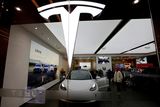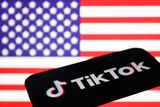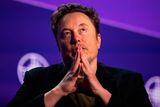Tech trouble – existential crises strike Tesla and TikTok
Technology





Two tech giants are in big trouble. Tesla, because of falling demand for its cars and its vision; and TikTok, because of a looming US ban.
Last week, Tesla cut the price on its Model 3 in Ireland again, to €38,600.
That’s over €10,000 less than it was 18 months ago.
Its poor quarterly results – with revenue and profits down and warnings of lower future deliveries – emphasised a global problem: sales of electric cars, in general, have stalled.
Questions over infrastructure and range are now being properly interrogated by mainstream drivers, poles apart from the eager early adopters, willing to put up with hassle.
Visitors check a Tesla Model 3 car in Beijing, China February 4, 2023. Photo: Florence Lo/Reuters
Chronic depreciation has also been a factor, pushing the cost of owning an EV way above the cost of owning a diesel or petrol car for some – the opposite of what buyers thought buying an EV represented.
Tesla is much more exposed to this than other car companies which make hybrid, petrol and diesel cars as well as purely electric ones.
So while the share prices of companies like Volkswagen (up 15pc), Ford (up 10pc) and General Motors (up 54pc) have all risen in the last six months, Tesla’s has fallen by 24pc. It’s barely worth more than half its value as of last July.
Recently launched Tesla models such as the glitchy, misfiring Cybertruck – which had to be recalled after a fault meant the accelerator might get stuck on maximum throttle – have not helped.
Neither have Elon Musk’s comments that Tesla sees questionable “robo-taxis” as its biggest new market push this year.
Musk’s credibility on delivering promised cars is sketchy
The only thing helping to stabilise Tesla’s value – it’s still the world’s most valuable car company, worth a multiple of most of its competitors – are Musk’s comments that he plans to make a cheaper Tesla, likely under €30,000, to go into production by the end of this year or early 2025.
But he hasn’t said whether that will be a new model, or simply a reworked Model 3 (from €38,600 at present) with fewer perks. Either choice would probably help sales.
But Musk’s credibility on delivering promised cars is sketchy, with some customers still waiting on delivery of the company’s Roadster sports car, six years after deposits were first taken.
If he doesn’t actually come out with a cheaper car, and sales continue to stagnate or fall, why is his company worth eight times that of Volkswagen, a company that sells five times as many cars as Tesla?
The US argues TikTok is potentially prone to infiltration by Chinese authorities hostile to US security. Photo: Getty
TikTok may be at similar risk of relative shrinkage. It’s about to be instructed by the US government that unless it’s sold by its China-based owner, Bytedance, it will be banned in the US.
The Americans have long threatened to do this, arguing that TikTok is potentially prone to infiltration by Chinese authorities hostile to US security, political and commercial interests. Last week, both US Houses of Congress passed the bill which mandates it.
So TikTok has nine months to find a US-friendly buyer or it will be banned in the US. Such a ban would likely be augmented by some sort of executive order to Apple and Google to exclude it from their US app stores.
New smartphones wouldn’t be able to download TikTok. It would fizzle away in the US
This tactic worked to sink Huawei’s phone business in western countries, when Google was instructed not to allow its Google Play (app) Store to be installed on Huawei phones.
If such an order were delivered to Apple and Google, Americans would then not receive any updates to the TikTok app, while new smartphones wouldn’t be able to download it. It would fizzle away in the US, with Instagram Reels and YouTube Shorts – two US-controlled services – likely to be the overwhelming benefactors.
This tactic worked to sink Huawei’s phone business in western countries, when Google was instructed not to allow its Google Play (app) Store to be installed on Huawei phones.
If such an order were delivered to Apple and Google, Americans would then not receive any updates to the TikTok app, while new smartphones wouldn’t be able to download it.
It would fizzle away in the US, with Instagram Reels and YouTube Shorts – two US-controlled services – likely to be the overwhelming benefactors.
Most observers predict that TikTok will fight the US move in the courts, arguing that it violates America’s first amendment. Photo: Getty
Are the Americans right to do this? This is a difficult question to answer: there has been no real hard proof that TikTok is an agent of the Chinese government in any way.
A probe by the Irish Data Protection Commissioner into whether, and how, TikTok transfers personal data from Dublin to China may give more insight into this. But for the moment, there is a bang of geopolitical one-upmanship going on.
There has been no real hard proof that TikTok is an agent of the Chinese government in any way
That leaves a question over what a post-US TikTok might look like. Might the Americans attempt to legislate extra-judicially, trying to order Google and Apple – as US-headquartered firms – not to carry TikTok at all, including in Europe?
This would affect millions of people who use TikTok, either for entertainment or to communicate with customers.
It would also likely affect the 3,000 people who work for TikTok at its Dublin-based international headquarters.
Most observers predict TikTok will fight the US move in the courts, arguing it violates America’s first amendment on freedom of speech, a tactic that worked when the state of Montana tried to restrict its use.
If so, that could drag the case out for years, during which we’ll all find another app to binge watch.
Join the Irish Independent WhatsApp channel
Stay up to date with all the latest news






















